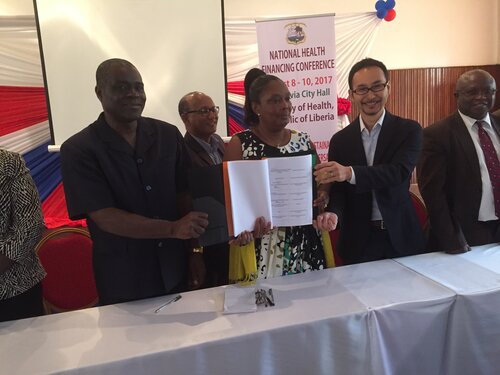UHC2030 hosted its annual UHC Day parliamentarian town hall to...
16 October 2017
Coordination of health sector actors remains critical for achieving stronger health systems.

The Government of Liberia has worked with its development partners to implement the ten-year National Health and Social Welfare Policy, 2011-2021 which emphasises strong partner coordination through mutually reinforcing measures at national and sub-national levels.
In May 2017, following a year of preparation, the Government, development partners, civil society organisations and the private sector signed a country compact to promote unity and harmonization in health system support. The new compact aims to enhance alignment to national policy that incorporates lessons from the Ebola Virus Disease crisis, minimize fragmentation, ensure more transparent funding for the sector, and promote mutual accountability.
The compact was supported by a joint financial management assessment (JFMA) of the health sector in April 2016 which involved the collaboration of government and seven development partners under the remit of IHP+, now UHC2030. The 2016 JFMA recommended a number of measures to strengthen financial management systems and support alignment of resources for the health sector, with those of the Ministry of Health and Ministry of Finance and Development Planning.
Developing the compact
The development of the compact in Liberia was a fully participatory and consultative process. The Health Sector Coordination Committee (HSCC) is the apex partner coordination mechanism in Liberia, chaired by the Hon Hon Bernice Dahn, Minister of Health and co-chaired by the WHO Representative in Liberia, Alex Gasasira.
In October 2016, a specially convened HSSC was held to discuss the principles of the International Health Partnership (IHP+), the findings and recommendations of Liberia’s 2016 JFMA and the draft compact for Liberia. During this meeting, valuable comments, suggestions and recommendations were made by international development partners, national partners and civil society organizations.
The technical team in the Ministry of Health, with support from WHO and the World Bank, incorporated the comments and suggestions from the October 2016 special HSCC meeting and recirculated the draft compact to the key stakeholders.
Hon Bernice Dahn, Minister of Health, convened follow-up consultative meetings with development partners and stakeholders to share the vision of the Ministry of Health as well as to listen to and incorporate suggestions from the partners.
Liberia has had a good experience of partner coordination and very strong Government leadership at the height of the devastating 2014-2016 Ebola Virus Disease crisis. This strong coordination was not maintained however during the post-Ebola period despite the presence of an Investment Plan for building a resilient health system in Liberia, 2015-2021.
Hon Minister Dr B Dahn re-emphasized the advantages of strengthened partner coordination in support of the Investment Plan at all levels. All development partners appreciated this and demonstrated it with their contributions to strengthening the draft compact.
Dr Alex Gasasira, WHO Representative in Liberia, appreciated the very strong commitment of the Hon Minister of Health as well as the Senior Management Team of the Ministry of Health. An important lesson learned during the process of developing compact is the need to listen more keenly to countries and key stakeholders at country level. This is very important to get full buy-in from all stakeholders that will go beyond the finalization and signing of compact, to its actual implementation.Read Liberia’s country compact 2017
More UHC2030 News
A global health financing emergency threatens progress toward...
UHC2030 at HSR2024: Advancing equity and inclusion in health systems through civil society knowledge
UHC2030, in collaboration with the SUPPORT-SYSTEMS research...
